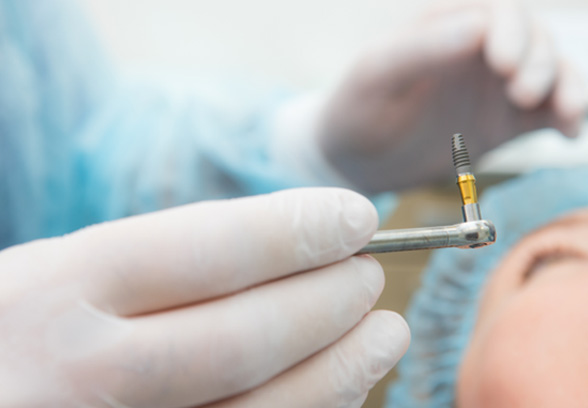Dental Implant Failure & Salvage – Loveland, OH
Rebuilding Your Smile Following Implant Failure
With a 95% success rate, dental implants are highly reliable. However, if any issues do arise, our team at Gerome & Patrice Family Dentistry are here to help. If you notice any signs that something may be wrong with your implants, please contact us as soon as possible. The sooner we see you, the sooner we can assess the situation and discuss treatment options to protect your smile.

Why Do Dental Implants Fail?

Dental implant failure can occur for several reasons, with the most common being peri-implantitis – a condition where bacteria and infection damage the tissue around the implant and the supporting jawbone. This often stems from poor oral hygiene and gum disease.
Other potential causes include trauma, unsuccessful osseointegration, or certain health conditions. Maintaining good oral care habits and following your dentist’s recommendations are essential to prevent issues and help ensure your dental implants remain healthy and strong.
Symptoms of a Failed Dental Implant

Dental implant failure can occur unexpectedly, whether soon after placement or even years later. Early failure typically happens during the healing period, while late failure can develop long after treatment. Be aware of the following signs that may indicate implant failure:
- Persistent pain around the implant site
- Swelling, inflammation, or tenderness
- Looseness or movement of the implant
- Receding or bleeding gums
- Discomfort or difficulty when biting or chewing
- Unpleasant taste or odor near the implant
- Visible changes in the implant area’s appearance
How Dental Implant Salvage Works

We’ll start with a thorough examination of your mouth to assess the condition of your dental implant and pinpoint the underlying issue. Once we’ve identified the cause, we’ll provide our treatment recommendations. For instance, if peri-implantitis is present, we can focus on treating the infection.
In some cases, it may be possible to restore your oral health without removing the implants. However, there are situations where removal might be necessary, though new implants can often be placed once the issue has been fully resolved.

